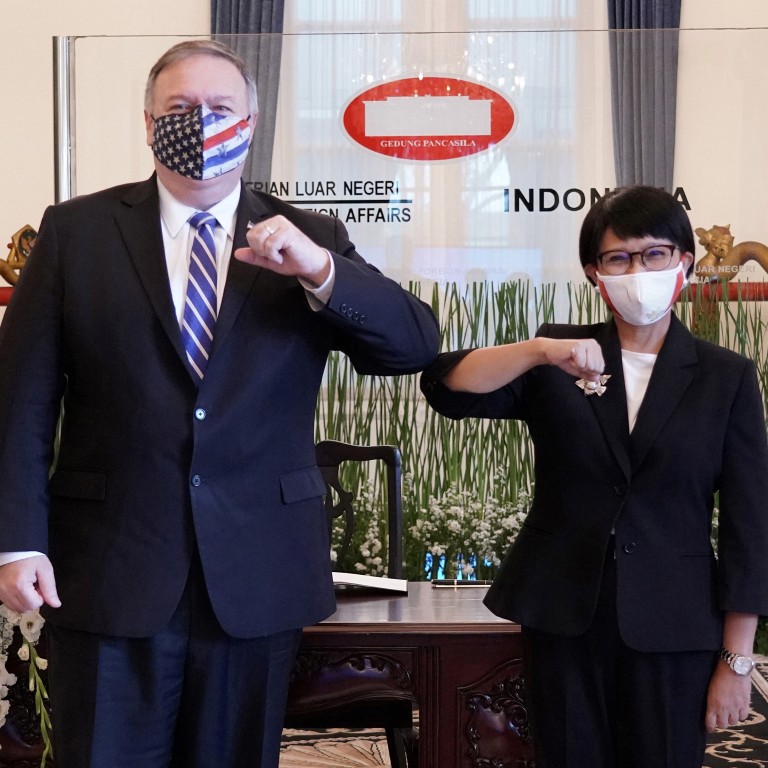
In Indonesia, Pompeo makes last gasp push for Trump’s China agenda
- The US Secretary of State uses Jakarta visit to single out Beijing’s handling of the coronavirus and its spats with neighbours in the South China Sea
- Jakarta, which does far more trade with China than the US, is more reserved. Analysts say if the US wants it to choose sides, disappointment looms
“I’m looking forward to cooperating together in new ways to ensure maritime security and protect some of the world’s busiest trade routes,” Pompeo added.
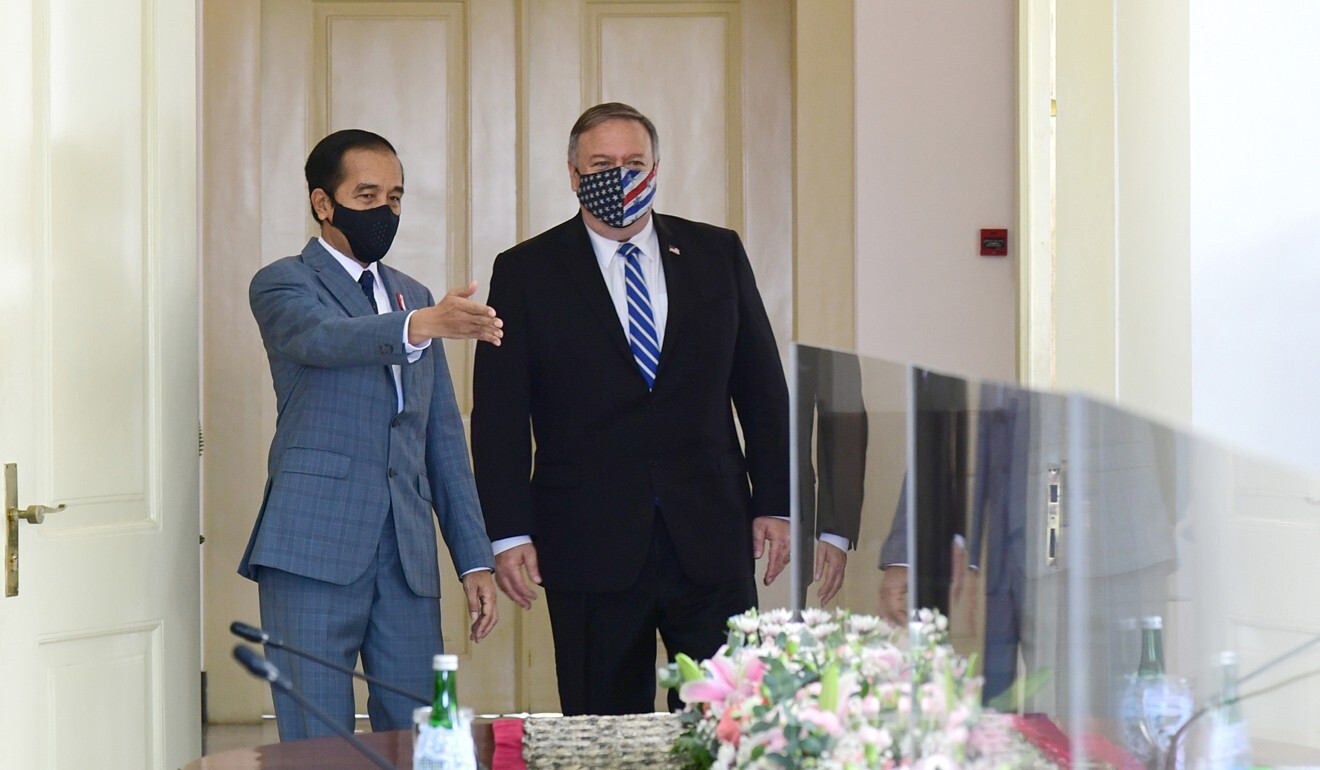
Responding to Pompeo’s remarks, Chinese foreign ministry spokesperson Wang Wenbin said the secretary of state’s true intention was to “let China fall back to an era of poverty and un-development, and let the world fall into the abyss of confrontation and division”.
“This is just the biggest threat facing the world today. But regrettably, Pompeo was born in the wrong time. The trend of peace, development, cooperation and win-win in this era is irresistible,” Wang told reporters.
Explained: Why are tensions running high in the South China Sea dispute?
Last month, Indonesian Maritime Security Agency drove out a Chinese coastguard vessel from the North Natuna Sea after a two-day verbal tussle via both vessels’ radio communication system.
“For Indonesia, the South China Sea should be maintained as a stable and peaceful sea. International laws – in particular UNCLOS 1982 – must be respected and implemented. Therefore, any claims should be based on universally recognised principles of international law including UNCLOS 1982,” Marsudi said, referring to the United Nations Convention on the Law of The Sea, an international treaty on coastal and maritime boundaries agreed in 1982 and signed by 167 states and the European Union.
She also encouraged US businesses to invest more in Indonesia, “including for projects in the outer islands of Indonesia, such as the Natuna Islands”.
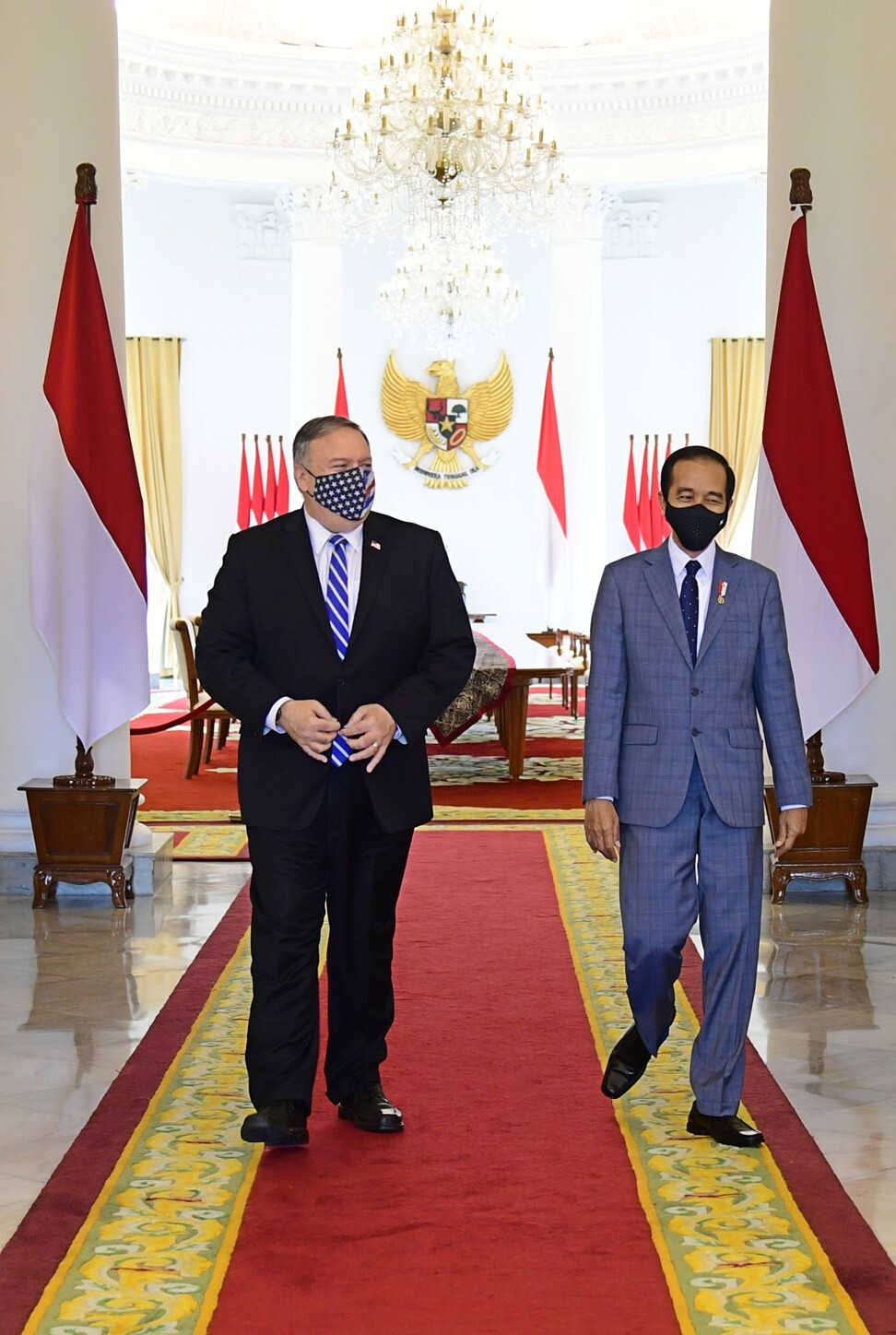
“I thank the US government for the cooperation with Indonesia during the pandemic, including through the provision of 1,000 ventilators. I also reiterated the importance of building national and regional health resilience, as the US could play a major role to support these efforts,” she said.
Pompeo said: “We are proud to have provided roughly US$11 million in US government assistance [to Indonesia], part of the more than US$20 billion the US government has pledged throughout the world.”
“We are poised to use that American tool to promote private sector investment that could support President Widodo’s plans to spend US$327 billion on more than 250 infrastructure projects,” Pompeo said.
Pompeo’s Indonesia visit to focus on Muslim youth group
“And I understand that every country is looking to create wealth for its people. The private sector needs the right incentives before it could jump in. Indonesia’s reform agenda is helpful in this regard, we hope you keep taking steps to cut red tape, eliminate corruption and increase transparency.”
Data from Indonesia’s investment coordinating board shows China realised US$2.4 billion of its investments commitment in the January-June period this year, more than Japan’s US$1.2 billion.
René Pattiradjawane, president of the Center for Chinese Studies-Indonesia and a fellow at the EastWest Institute, said China was a more important trade partner to Indonesia than the US at the moment.
“Our total trade with China is around US$70 billion, compared to our trade with the US which is only around US$28 billion. For [Widodo’s] administration, China is also an important source of investment for infrastructure developments, despite several issues that have arisen domestically ... It will be easy for Indonesia to get loans from China, compared to getting loans from the US because so many restrictions are implied,” Pattiradjawane said.
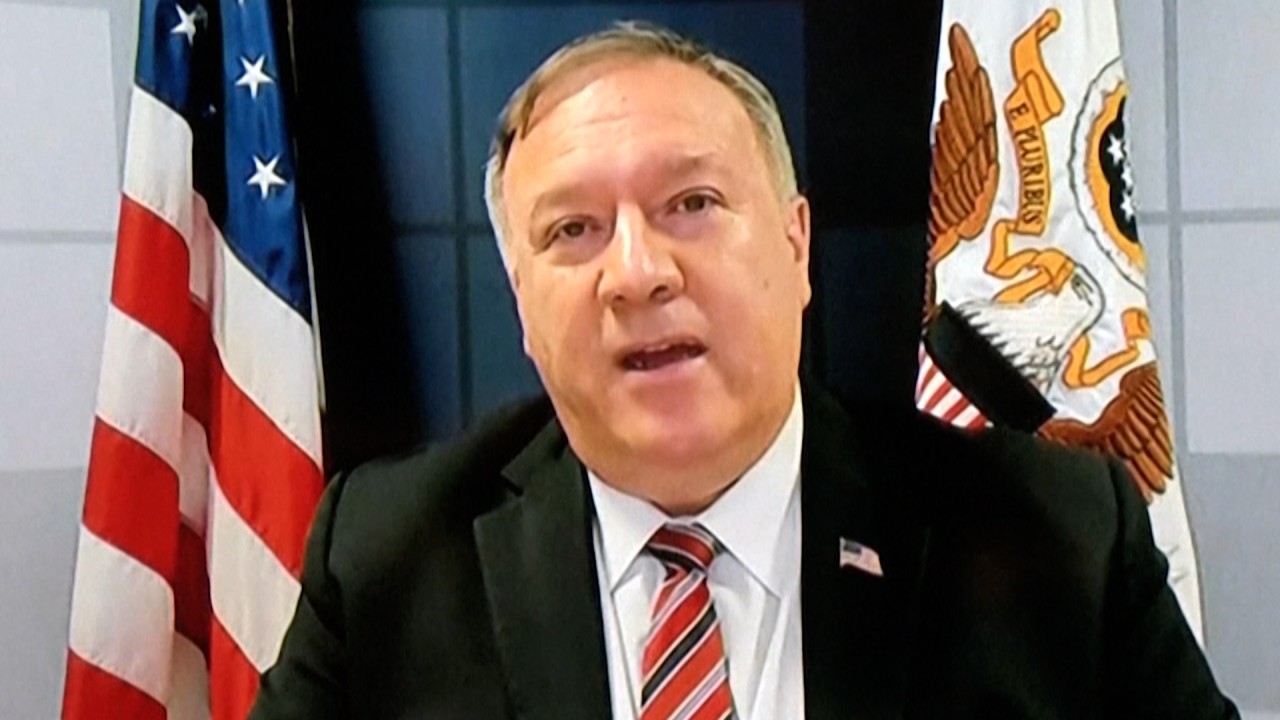
00:53
South China Sea: Don’t let China ‘walk over us’, says Pompeo during Asean meeting
Analysts said Pompeo’s decision to visit Indonesia was a last-minute attempt to shore up support for the US within Southeast Asia. It was also an opportunity to smooth ties between the two nations after Jakarta reportedly rejected a high-level proposal by the US to allow one of its spy planes to refuel on Indonesian soil in July and August.
“It’s a good and opportune time to be able to cement the US-Indonesia relationship, especially coming off the recent visit by Indonesia’s defence minister Prabowo Subianto to the US as well. When looking to shore up US support within Southeast Asia, Indonesia is a natural choice, being the de facto leader,” said Natalie Sambhi, a PhD scholar at the Strategic and Defence Studies Centre, Australian National University.
She said the differences over the spy plane were “another element of this”. “Indonesia has never had an inclination to be able to host any kind of overt military presence of a foreign country, so I think this is an opportunity for Pompeo to smooth things over with Jakarta,” she said.
Indonesia, Singapore steer clear of US-China dispute in Pompeo’s outreach
Analysts said the US would struggle to persuade Indonesia to choose sides between China and the US, or to join the Quad grouping – of the US, Japan, India, and Australia – that has publicly stated concerns about China’s rising influence in the world.
“The Trump administration is clearly seeking to strengthen relations with Indonesia as US-China competition in Southeast Asia escalates. While Indonesia is receptive to a closer security relationship with America due to China’s increasingly assertive activities in the South China Sea, there are limitations. Indonesia is proud of its non-aligned status and ‘free and active’ diplomacy. It won’t want to breach those principles by moving too close to the US or the Quad,” said Ian Storey, senior fellow at the ISEAS Yusof Ishak Institute in Singapore, who specialises in Asian security issues.
Pompeo’s second visit to Indonesia, so late in his stint as the US Secretary of State, is also seen as a show of confidence that Trump will win re-election in the US presidential election next week. He first visited the country in 2018.
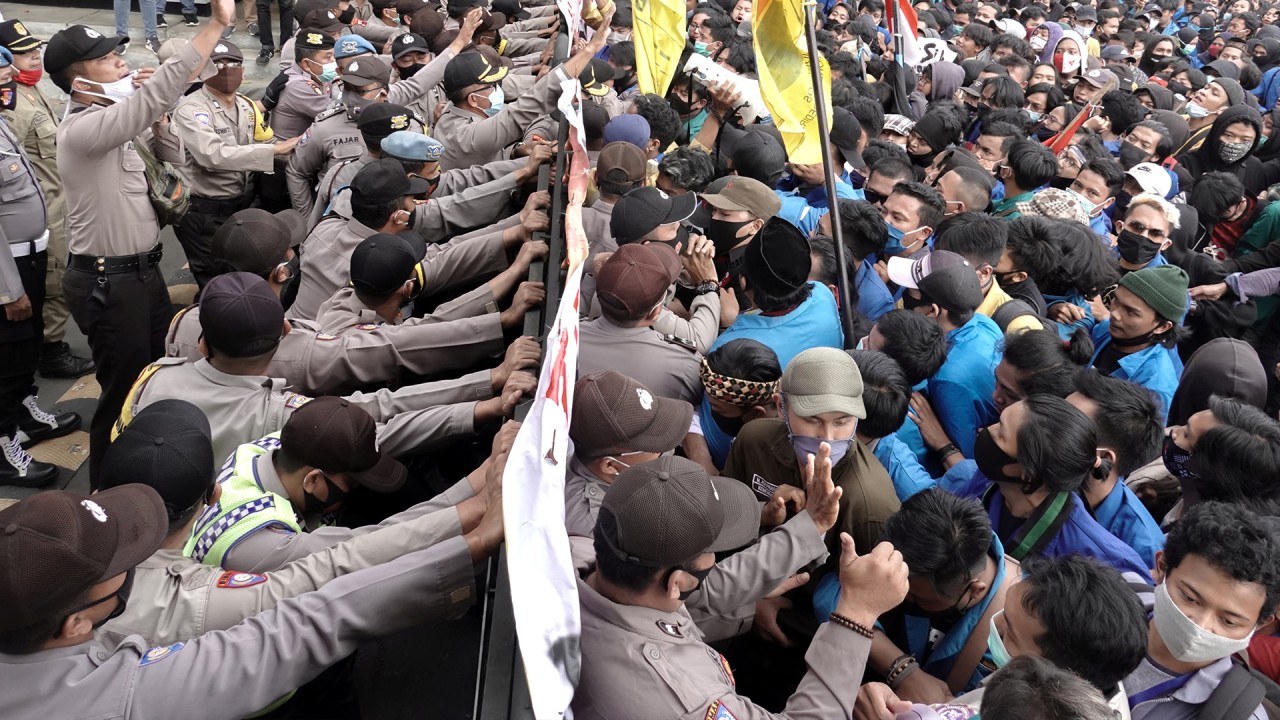
01:31
Indonesian police fire tear gas as thousands of people protest against new labour law
“Regardless of how much of a role the Secretary of State has actually in domestic campaigning, he’s not going to stop this kind of diplomatic role. In a way the Trump administration is signalling a sense of confidence, like ‘we’re going to continue right up to the last minute, because we expect President Trump to be there for another four years’,” Natalie of ANU said.
After a meeting with Indonesia’s president, Pompeo held a discussion with GP Ansor, the youth organisation affiliated with Nahdhlatul Ulama, the country’s – and the world’s – largest mass Muslim organisation.
Pompeo is expected to visit Vietnam later on Thursday, an additional stop announced at the last minute. The Vietnamese government’s news website said Pompeo’s visit would mark the 25th anniversary of diplomatic relations between the two countries. The former war foes have enjoyed warmer relations in recent years but trade tensions have emerged lately.
The US Trade Representative confirmed in August that at Trump’s behest, it was investigating whether Vietnam had been undervaluing its dong currency and harming US commerce. Vietnamese Prime Minister Nguyen Xuan Phuc this week called on Trump to have “a more objective assessment of the reality in Vietnam” with regards to the trade imbalance between the two countries. He said exchange rate policy was not aimed at helping exports.
Additional reporting by Associated Press and Reuters

